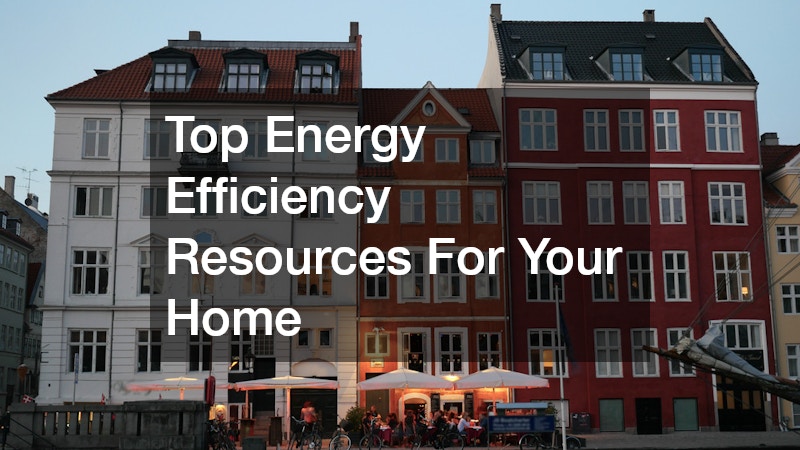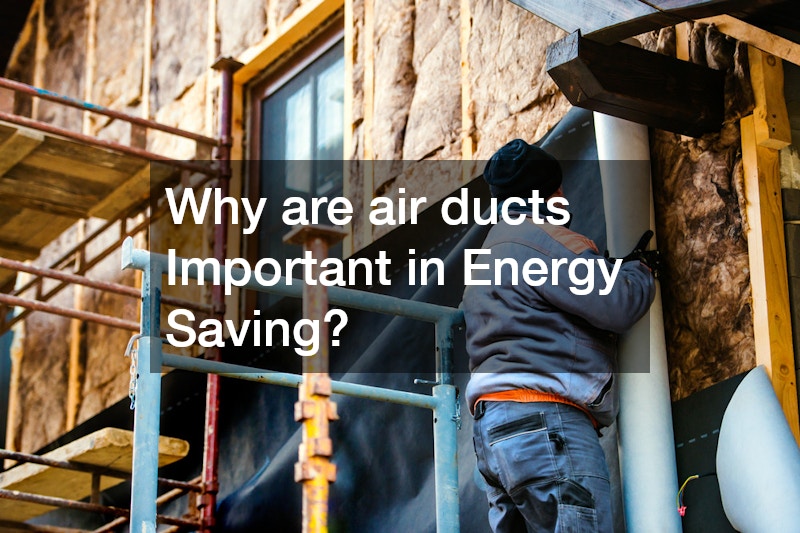
Top Energy Efficiency Resources For Your Home
Energy efficiency is a critical aspect of modern home management, aimed at reducing energy consumption, cutting costs, and minimizing environmental impacts. With rising energy costs and increasing awareness of environmental issues, homeowners are continually seeking ways to make their homes more energy-efficient. This comprehensive guide will walk you through the top energy efficiency resources available for your home, exploring 10 key areas where you can make significant improvements.
Each section will delve into specific elements of home energy efficiency, discussing the importance of air ducts, the benefits of energy-efficient windows, smart thermostats, and more. Whether you’re considering a new water heater installation service or consulting with AC contractors, this guide provides a detailed breakdown of where to start. We’ll cover tips for working with an air duct cleaning company, local flooring companies, and more, ensuring you have all the information needed to make informed decisions.
By the end of this article, you will have a deeper understanding of how each component affects your home’s overall energy efficiency. You’ll learn how to leverage resources like local roof repairs, custom window treatments, and HVAC maintenance services to optimize your home’s energy use. With practical advice and actionable steps, this guide empowers you to make impactful changes in your home. Read on to discover how you can create an energy-efficient environment that caters to your needs and contributes positively to the planet.
Why Are Air Ducts Important in Energy Saving?

Air ducts play a crucial role in maintaining energy efficiency within your home by facilitating the circulation of air in heating and cooling systems. An efficient system translates to less energy waste and reduced utility bills, making air ducts a vital component in home energy-saving construction. The distribution of cooled or heated air depends heavily on the condition of your air ducts, highlighting the importance of regular maintenance by a trusted air duct cleaning company.
When air ducts are not properly sealed or insulated, you may experience energy loss through leaks or poor air circulation. This loss requires hasty HVAC adjustments, driving up energy consumption. To combat these inefficiencies, homeowners should engage an air duct cleaning company to perform regular inspections and maintenance, ensuring sealed connections and optimal airflow. By doing so, you can effectively reduce energy waste, lowering your carbon footprint and monthly expenses.
Investing in air duct upkeep can lead to long-term savings. Beyond saving energy, maintaining clean and efficient air ducts improves indoor air quality, creating a healthier environment for your family. An air duct cleaning company can provide the necessary services to keep your ducts in top condition. This proactive approach ensures your home remains comfortable and efficient year-round, highlighting energy efficiency resources as a priority in energy-conscious home improvements.
How Do Energy-Efficient Windows Help?
Energy-efficient windows are a vital component in any energy-saving construction project, significantly impacting your home’s energy usage. They are designed to reduce heat loss in the winter and minimize heat gain in the summer, thus optimizing indoor climate control. Energy-efficient windows achieve this through advanced materials and technologies, such as low-emissivity coatings and multi-pane glass. Custom window treatments can further enhance these benefits by adding an extra layer of insulation.
Investing in energy-efficient windows can lead to substantial savings on heating and cooling expenses. These windows help maintain a stable indoor temperature, reducing the need for constant air conditioning or heating. When paired with custom window treatments, the energy-saving potential of these windows is further amplified. The use of energy efficiency resources in this context not only enhances your home’s aesthetics but also plays a fundamental role in energy conservation.
In addition to energy and cost savings, energy-efficient windows contribute to better indoor air quality and comfort. They help reduce condensation, lower noise pollution, and protect your interiors from UV damage. Collaborating with reputable AC contractors can ensure the correct installation of these windows, optimizing their performance. This strategic approach to improving window efficiency is crucial for creating a sustainable and comfortable home environment.
What Are Smart Thermostats and How Do They Function?
Smart thermostats are an innovative solution in energy-saving construction, offering homeowners advanced control over their heating and cooling systems. These devices learn your schedule and preferences, automatically adjusting temperatures to maximize efficiency. This adaptability reduces unnecessary energy consumption and allows you to manage your HVAC system more effectively, often with the help of professional AC contractors.
The technology behind smart thermostats allows users to control their home climate remotely via smartphones or tablets. This feature is particularly beneficial for adjusting settings when no one is home, ensuring energy isn’t wasted. AC contractors can assist in setting up these systems, ensuring they sync perfectly with your existing HVAC framework. By optimizing heating and cooling cycles, smart thermostats play a key role in managing energy use and increasing savings.
Moreover, smart thermostats provide valuable insights into energy usage patterns, empowering homeowners to make informed decisions on consumption. They often come with detailed reports and energy-saving suggestions, contributing to a healthier bottom line and a more sustainable lifestyle. Through proper installation and use, smart thermostats symbolize the intersection of technology and energy efficiency, marking energy efficiency resources as a pivotal element in modern home management.
Can a Chimney Make a Difference in Airflow?

Chimneys are more than just aesthetic features; they also play an integral role in energy-saving construction by improving your home’s airflow. Proper airflow is crucial for maintaining efficient heating, and a well-maintained chimney can enhance this. By providing a natural path for hot air to escape, chimneys can prevent heat from building up inside, especially when paired with regular chimney repairs.
When chimneys are well maintained, they provide effective ventilation, which is key to reducing energy wastage. If not properly managed, however, they can allow drafts and leaks, which compromise heating efficiency. Engaging professional chimney repairs ensures that chimneys remain unobstructed and equipped with proper liners for enhanced insulation. This attention to maintenance is a critical aspect of energy efficiency.
Furthermore, chimneys impact indoor air quality by facilitating the removal of smoke and fumes, contributing to a healthier living environment. Proper chimney repairs and maintenance can optimize their function, ensuring they complement your heating system effectively. This detailed attention underscores the broader picture of energy efficiency resources in comprehensive energy-saving strategies, highlighting their value beyond mere aesthetic enhancement.
How Often Should HVAC Be Inspected?
Routine HVAC inspections are essential components of energy-saving construction, ensuring systems operate efficiently year-round. Experts recommend annual inspections by reputable HVAC maintenance services to identify potential issues before they become costly problems. These inspections focus on evaluating system performance, cleaning components, and checking refrigerant levels to maintain peak efficiency.
Regular HVAC system checks prevent energy loss caused by malfunctions or poor performance, ultimately lowering energy bills. Certified HVAC maintenance services can enhance the lifespan of your system by ensuring all components function correctly. This proactive stance in equipment management contributes significantly to reducing overall energy consumption, a key element in promoting energy efficiency resources in your home.
Additionally, maintaining your HVAC system supports indoor air quality by ensuring efficient airflow and functioning filters. This approach minimizes the chances of contaminants affecting your living space while optimizing heating and cooling processes. Partnering with HVAC maintenance services for regular inspections keeps your home energy-efficient and comfortable, underscoring the importance of proactive system care.
What Role Do My Floors Play?
Floors are often overlooked in energy-saving construction, yet they play a significant role in thermal regulation within your home. Effective insulation of floors helps maintain consistent indoor temperatures, reducing the load on your heating and cooling systems. By consulting local flooring companies, homeowners can explore the best materials and insulation techniques to improve energy efficiency.
Different flooring materials come with varying insulation properties, influencing how much heat is retained or lost. Hardwood and carpet, for instance, offer different levels of insulation, with carpets generally better at retaining heat. Collaborating with local flooring companies can help select the right type based on your specific energy needs and aesthetic preferences.
In addition to insulation, flooring can impact air quality by affecting the accumulation of dust and allergens, which can reduce energy efficiency if they enter HVAC systems. Regular maintenance and selecting energy-efficient flooring materials contribute to a healthier and more efficient home environment. The focus on floors in energy-saving construction demonstrates how every element, including energy efficiency resources, plays a role in a holistic energy strategy.
Is Cool Roofing Worth the Investment?

Cool roofing is an innovative solution in energy-saving construction, offering substantial benefits in energy cost reduction and indoor comfort. These roofs are designed to reflect more sunlight and absorb less heat than traditional roofing materials, making them an excellent choice for warmer climates. The use of reflective paint, sheet coverings, or reflective shingles ensures that the roof remains cooler, requiring less energy to cool the home.
The investment in cool roofing can significantly reduce air conditioning costs, especially during peak summer months. With lower heat absorption, interiors remain cooler, reducing the reliance on artificial cooling methods. Consulting with local roof repairs can help identify the best solution for your home, optimizing both energy savings and roof durability.
Besides energy savings, cool roofs contribute to improved building comfort and longevity by reducing thermal stress. This reduction in temperature extremes can also extend the lifespan of the roof and related systems. Investing in cool roofing is not only an energy-efficient decision but also reinforces energy-efficiency resources as a strategic move to improve home sustainability and reduce environmental impact.
How Does the Compressor Contribute?
The compressor is a critical component in any heating and cooling system, integral to energy-saving construction. It plays a role in converting refrigerant gas into liquid, which is then used to heat or cool your home. The efficiency of your compressor directly affects the energy consumption of your entire system, highlighting the importance of having it installed and maintained by a qualified compressor installer.
When compressors function inefficiently, they drive up energy consumption due to increased workload on the HVAC system. Regular maintenance ensures they operate at optimum capacity, reducing energy waste. Collaborating with a compressor installer helps assure this component’s reliability, maximizing energy efficiency resources in your home energy strategy.
Additionally, advancements in compressor technology mean they are becoming more efficient, with variable-speed technology being one of the key innovations. This allows for more precise temperature control, saving energy by adjusting output to meet real-time heating and cooling demands. Partnering with a certified compressor installer ensures your system benefits from these technological advances, contributing to a more sustainable, cost-effective home environment.
What Type of Water Heater Should I Get?
Choosing the right water heater is a critical decision in energy-saving construction, significantly affecting home energy use. Traditional water heaters continuously heat stored water, consuming more energy. In contrast, newer models like tankless water heaters heat water on-demand, resulting in substantial energy and cost savings. Working with a water heater installation service can guide you to the best choice for your specific needs.
Tankless water heaters are particularly effective for energy savings as they eliminate standby heat loss, making them a more efficient option. They provide hot water only when needed, dramatically reducing wasted energy used in heating stored water. A professional water heater installation service can evaluate your usage patterns to recommend the best system for maximum efficiency in your home.
Besides energy usage, the right water heater can enhance comfort by providing an uninterrupted supply of hot water. Selecting a model with an appropriate capacity is critical to meeting demand while maintaining efficiency. Partnering with a water heater installation service ensures your system is correctly set up, supporting energy efficiency resources in your comprehensive energy efficiency strategy and promoting long-term sustainability.
What Is the Impact of Water-Saving Fixtures?

Water-saving fixtures are a fundamental component in comprehensive energy-saving construction, contributing to both water and energy conservation. These fixtures, including low-flow showers and faucets, reduce the amount of water used without sacrificing performance. Partnering with local water conditioning companies can help you select and install fixtures that optimize water savings and enhance energy efficiency.
By reducing water use, these fixtures decrease the energy needed for water heating. This contributes to reduced utility bills and less strain on water heating systems, aligning with energy efficiency resources objectives in a sustainable home strategy. Local water conditioning companies can offer insights into the latest innovations, ensuring your home incorporates the most effective technologies for optimal results.
Beyond individual savings, employing water-saving fixtures addresses broader environmental concerns by conserving a vital resource. These fixtures help reduce the overall demand on community water supplies, playing a small but significant role in environmental preservation. Working with local water conditioning companies to implement these fixtures reinforces a commitment to sustainability and efficiency, rounding out a dedicated energy management approach.